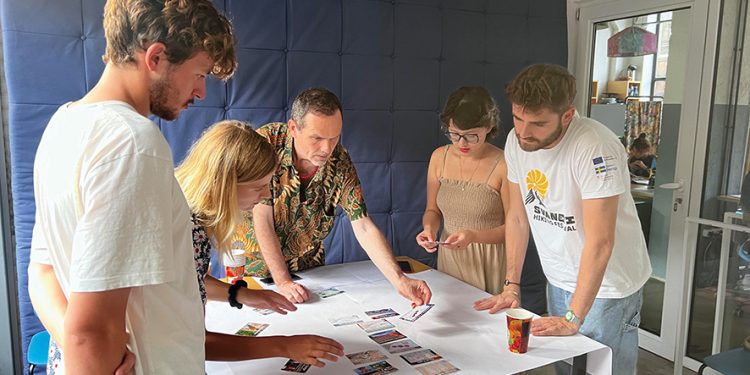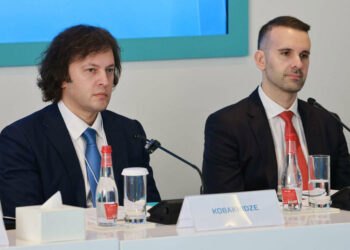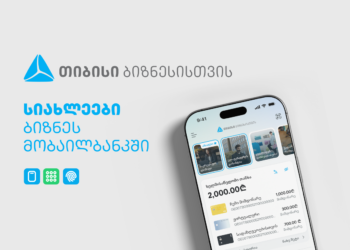Climate Fresk is a collaborative workshop that has been brought to Georgia to educate individuals about climate change through a fun and collective atmosphere.
NGO Climate Fresk, was founded in France in 2018 by Cédric Ringenbach to raise awareness and participation in workshops around the world regarding climate change. The game has been conducted in over 130 countries with facilitators, Georgia being the most recent. Facilitator of Climate Fresk, Benoit Marienval, said they brought the workshop to Georgia so local individuals could organize the game moving forward and help the global community grow.
“It’s an open tool, because our main purpose is to train facilitators to become autonomous, to make workshops for others, to disseminate, to grow,” said Marienval.
Every workshop is three hours long and is based on factual information from the annual Intergovernmental Panel on Climate Change (IPCC) report. According to Marienval, the sessions are established 100% on science, and address a tough topic in an easy, positive, and fun environment, that can otherwise be hard to talk about. Each session has a maximum of 10 people to keep it small, collaborative, and intimate.
Marienval explained that the sessions follow the head, heart and hands theory of collective intelligence. Workshops begin with understanding the topic of climate change, using the head, then shift to talking about how people feel about the topic, using the heart, and end with a call to action that can be taken by individuals, consumers, companies, and others, which uses the hands. Once guests have completed the game, they can attend a training session to become facilitators themselves.
Between three hours of playing and four hours of training, a person can become certified to be autonomous and conduct the workshop when and where they see fit.
“We just want to create a good dynamic for people to be a part of the contribution toward climate change,” Marienval told GEORGIA TODAY. “It’s a very tough and difficult topic, a fighting topic, because it asks you to change your life, your models of success, to reshape all perspectives.”
There were two workshops conducted in Georgia, one internal for team members of CENN, an organization working to protect the environment in the South Caucasus, and the other was open to the public. Since CENN is a sustainably based NGO in Georgia, Marienval said they would be the ones to initially continue Climate Fresk in the country with trained facilitators. Between both sessions, they estimate that five to six people will go on to the training session to become autonomous, print the game, and officially join Fresk.

Professor of Russian and Global Studies Yvonne Howell, at the University of Richmond in the United States, was searching for something she and her students could do while on their study abroad trip in Georgia, which is when she found Climate Fresk. Howell said she describes herself as more knowledgeable than the average person when it comes to climate change, because she has attempted to learn about it and even teaches it in one of her global studies courses. However, she said that regardless of all the things happening in the world, nationalism, wars, and economic crises, it all fails in the face of climate change.
“Even for me, who feels like I’ve tried to teach these basics to other people, this was more impactful, understandable, and true,” said Howell. “I felt like I’ve really learned a lot, in a way that is lasting.”
1.7 million people have played this game around the world. More than half of those are in France, where the workshop originated. Marienval said it has become a key tool throughout the country in terms of cultural awareness and has been played by ministers, government figures, schools, and companies alike. Currently, Marienval is traveling from France to Japan to teach and train people about Climate Fresk in countries where there are no facilitators, and to support those in the countries where there are.
Marienval said the concept was created when Ringenbach, the founder, who is also a teacher, was trying to promote awareness of climate change to his students with the use of graphs and images. He made it interactive, scrambling cards with information into different orders for his students to determine the correct order. From this exercise he realized using collective intelligence was much more powerful than showing slides and lecturing. The students had a better grasp of the concept after playing, and wanted to act.
This concept of climate change, which has been ongoing for decades, will get worse for the next generations. He said people need to raise awareness about it and prepare to take collective action to create bridges and links. Marienval believes Climate Fresk allows people to accomplish that by debating in a non-judgmental way and by determining what everyone can contribute, together.
“I think it’s one of the biggest challenges we face as humanity. This is completely different from the other challenges, because you have wars, inequalities, and human disasters, but this topic is way different,” Marienval told GEORGIA TODAY. “It is irreversible; you cannot go back to the past. When we change the climate, it’s changed for 1,000 years. When there is a war between two countries and it’s done, we can come back to something joyful, or peaceful, but when climate changes, we cannot go back.”
By Shelbi R. Ankiewicz














